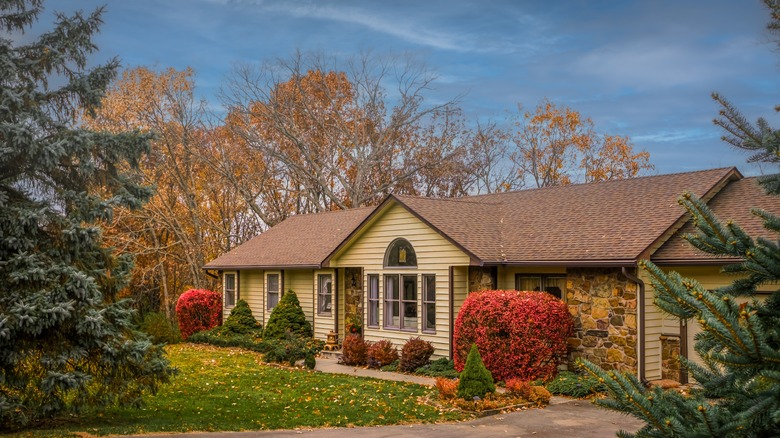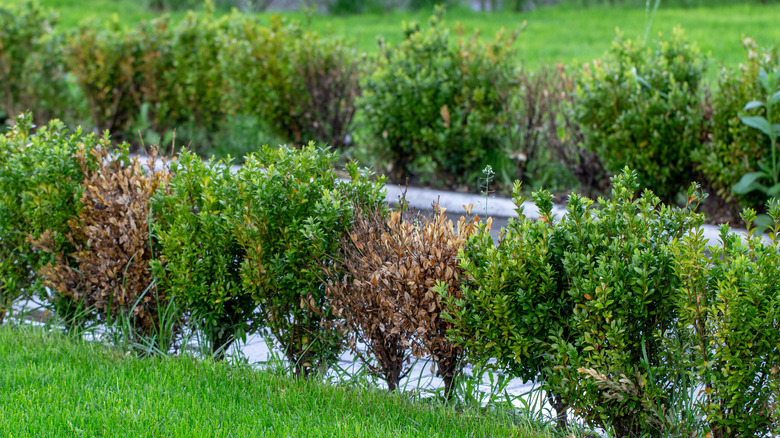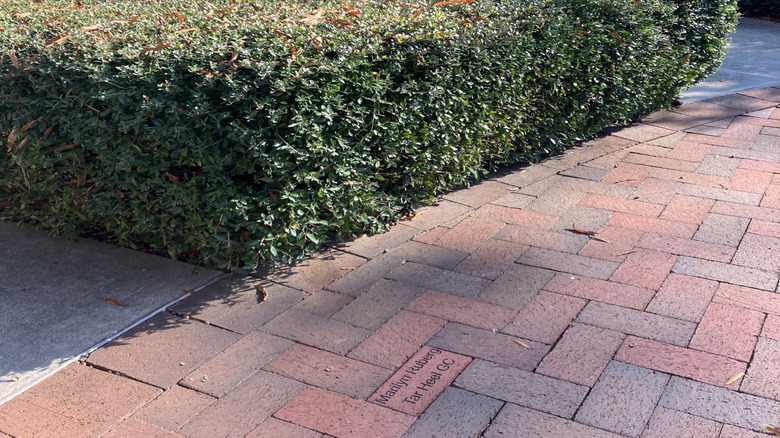It's Time To Retire This Outdated Front Yard Landscape
Boxwoods have become one of the most common landscape plants in gardens across the country. Their popularity stems from their compact, symmetrical form that works well as a hedge or as a backdrop for annual and perennial flowers. They're also evergreen, so they provide color year-round even after everything else has died back or gone dormant. Despite their apparent usefulness, there are many downsides to planting boxwoods in your landscape. There are also many alternative species with fewer problems that can achieve whatever goal you might have for those boxwoods.
One of the biggest mistakes everyone makes when growing boxwoods is assuming that their low-maintenance reputation means they don't need much care at all. While they're not as finicky as some plants, they're still prone to pests and diseases. And those issues are even more likely (and more damaging) when your boxwoods are stressed, whether from heat, frost, or drought. Most recently, the box tree moth and boxwood blight, in particular, have become more widespread, rendering your once low-maintenance shrubs into plants that require regular treatments and pest management.
Fortunately, boxwoods aren't the only option for your landscape, even if they are the ones you see most often in your neighbors' yards. Whether you're looking for a low-maintenance living privacy fence, an evergreen shrub that is perfect for plant sculpting, a lush foundation planting, or any of the other uses gardeners turn to boxwoods for, keep reading for less disease-prone alternatives that can do the job with fewer problems.
The downsides of planting boxwoods in your garden
The key drawback of planting boxwoods is the risk of disease and pests. While you can find varieties that are resistant to some of those problems, no variety is completely immune to all problems. For example, boxwood blight is a fungal disease that affects all types of the evergreen shrub. Some of the telltale signs of boxwood blight include leaf spots that are quickly followed by browning and leaf drop.
With this fungal disease, you'll typically notice these symptoms first on the lower branches, but it'll work its way up to higher branches as the disease spreads. Currently, there are no varieties known to be resistant to this form of blight. And without management, the repeated browning and leaf drop can end up killing your boxwood. These pest and disease problems are even more of a risk if you're using boxwoods as a formal hedge or privacy screen. One disease or insect could end up wiping out your entire hedge in one fell swoop.
Even if you have an established boxwood hedge that you don't want to rip out entirely and replace, you should consider swapping out a few with an alternative species to minimize the risk of losing the entire hedge to a single infestation. By alternating your existing boxwoods with other evergreen species that are resistant to the pests or pathogens that plague boxwoods, you can help contain any outbreaks and provide some insurance that at least part of your hedge will survive even if the boxwoods are wiped out.
Boxwood alternatives to use in your landscaping
If you're ready to get rid of your boxwoods or you're convinced you shouldn't plant them in the first place, the next step is to find the best alternative to suit your landscaping needs. To start, look for evergreen shrubs and small trees that are native to your region. Then, narrow those options down to ones that are best adapted to the light and soil conditions where you want to plant them. A good way to ensure any plant in your landscape is as low-maintenance as possible is to choose something that already thrives in the conditions you have.
If you're trying to create a formal hedge or play around with shapes and designs, one of the most sculptable alternatives to boxwood includes yaupon holly (Ilex vomitoria). But cherry laurel (Prunus caroliniana) or eastern red cedar (Juniperus virginiana) are also good options that can tolerate some pruning. All of these also work great as a living privacy screen thanks to their dense, evergreen foliage. Note that all of these do prefer full sun, though the yaupon holly and cherry laurel can tolerate some shade.
For shady spots where boxwoods and the alternatives above might not thrive, try American holly (Ilex opaca). It prefers shade and is relatively disease and pest-free. Another good option for shadier yards, especially if the site also has wet soil, is the anise tree (Illicium parviflorum). This native broadleaf evergreen is especially deer-resistant and named for its licorice-like fragrance.


